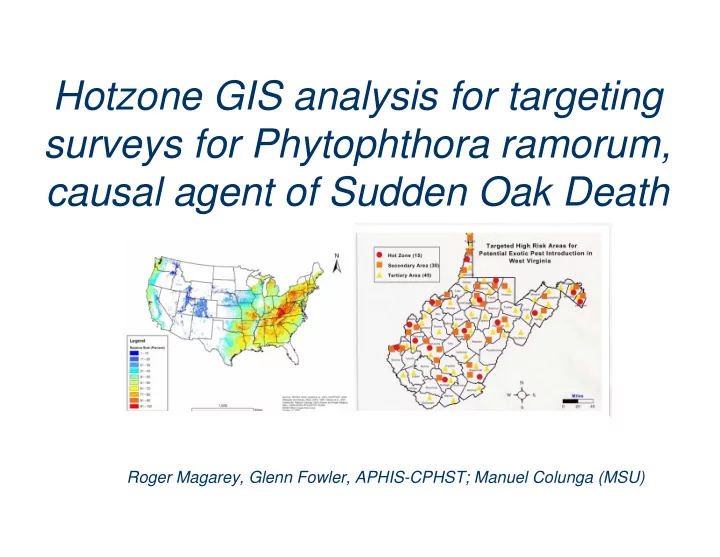

Hotzone GIS analysis for targeting surveys for Phytophthora ramorum, causal agent of Sudden Oak Death Roger Magarey, Glenn Fowler, APHIS-CPHST; Manuel Colunga (MSU)
Hotzone GIS Analysis • What is GIS Hotzone analysis • Examples • Crude SOD analysis • Future Hotzone analysis tools
Hotzone Analysis • Mapping the introduction potential of the pathogen is an important but difficult element for completing the triangle and implementing the hotzone GIS analysis.
Hotzone Definitions • HOT ZONE AREA Review supporting documentation which identifies known infested material that enters a specific area within your state (i.e. marble wholesale warehouse) • SECONDARY SHIPPING ZONE AREA Identify those areas that receive material from known infested suppliers (i.e. nursery stock received from an infested nursery) • TERTIARY AREA Areas that have high potential for possible introduction not based on actual infested material received (i.e. sea container storage yard) Source J. Messineo APHIS.
Source Frank Sapio et al. USFS
Susceptibility Risk: Sirex noctilio Draft Source Marla Downing, USFS
SOD Hotzone Analysis Circa 2004 To create a model that will rank US states in terms of relative risk for sudden oak death incursion. To create a risk index stratified by state based on shipment quantity, climate, host strength, and economic potential. Each sub-index is assigned a value between zero and one. The overall index is the multiplicative product of each index.
Shipments Shipments Shipments are based on 5 nurseries
Relative Shipments Relative Shipments Shipments are based on 5 nurseries
Climate Infection > 60 days Sudden Oak Death Wetness > 12 h
Relative climate Relative climate
Relative host strength Relative host strength
Relative host strength Relative host strength Shrub data was not used in this analyses
Relative host strength Relative host strength
Relative economic strength Relative economic strength
Overall Risk Overall Risk
APHIS Hotzone Architecture Decision Perspective Pest Survey Specialists National Program State Plant Health Regional Program Managers Directors Plant Managers Regulatory Officers Decision Regional National State Making Screen Screen Screen NAPPFAST Hotzone Resource Tables, Maps Allocation Tables, Maps Graphs Box Graphs Analysis Analytical Modeling Analytical Habitat Tools Tools Tools Model Other Personnel Traps Materials SQL Data Data Management PPQ 309, Sales NAPIS Commodity Foreign Trade ATS Other Other Genie Data Flow Data 429,523 Survey Data PDA PDA PDA JMR 6/1/05 Sourcing
2) Identify, document and prioritize databases for use within the pest detection inf national, regional and state scales. Description Information Application Database PPQ 309A Pest interceptions Taxonomic ID of pest, commodity port. APHIS i) Identifies pest (electronic) PPQ stores its reportable pests from all pathways association with (rail, air, sea, land, and inspection stations). It is imported commodity. used to determine what pests are found on what ii) Pest interception commodities, seasonality and frequency of pests. volume and distribution 429 Fumigation database Identifies pathways requiring treatment i) Identify pest (Electronic) pathways 523 Emergency action 1) Violation/pest found (i.e. snail, bark beetle, bark i) Identify pest notification contamination), 2) Shipper name and country of pathways (Lotus notes) origin and 3) Recipient address. Customs ATS AUTOMATED Restricted to users with security clearance. Pinpointing trap TARGETING Queries or reports could be dumped into system locations with current SYSTEM (ATS) on a periodic basis. Data queries could include or recent historical commodity, importer address, shipment numbers. data Commerce Sales Genie Commercial sales Address of importers and distributors. Locations of databases Distributors within United States. CFS Commodity flow Data on shipments: domestic destination or port of Commodity volume survey (electronic) exit, commodity, value, weight, mode(s) of and distribution within transportation, the date on which the shipment the United States
Decision Products Top Hits Allocated Resources National Habitat Pathways Hot Zones National Regional Picks Hot Zone Survey $ 426,000 Local Type 1 66,500 Host Type 2 43,400 Location Type 3 23,000 Diag $ 567,000 Type 1 142,000 Type 2 59,000 Person $ 900,000 Group 1 750,000 Group 2 35,000 Equip $ 375,000 Type 1 225,000 Type 2 57,900
Top Hits Allocated Resources National Habitat Pathways Hot Zones National Regional Picks Hot Zone Survey $ 426,000 Local Type 1 66,500 Host Type 2 43,400 Location Type 3 23,000 Diag $ 567,000 Type 1 142,000 Type 2 59,000 Person $ 900,000 Group 1 750,000 Group 2 35,000 Equip $ 375,000 Type 1 225,000 Type 2 57,900
Top Hits Allocated Resources National Habitat Pathways Hot Zones National Regional Picks Hot Zone Survey $ 426,000 Local Type 1 66,500 Host Type 2 43,400 Location Type 3 23,000 Diag $ 567,000 Type 1 142,000 Type 2 59,000 Person $ 900,000 Group 1 750,000 Group 2 35,000 Equip $ 375,000 Type 1 225,000 Type 2 57,900
SOD Hotzone Analysis Adding the introduction potential of the pathogen is an important element in the modeling and risk analysis process APHIS is attempting to create a web site for automating the creation of risk maps for invasive pests based on climate suitability, hosts and introduction potential Help wanted!
Recommend
More recommend